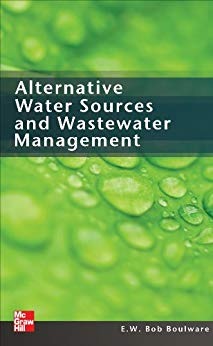Book Review: Bob Bouleware’s 'Alternative Water Sources and Wastewater Management'

Book Review
Bob Bouleware’s Alternative Water Sources and Wastewater Management (2012) offers an excellent overview of the intersection between precipitation harvesting (rain, fog, dew) and wastewater management. By bringing these topics together, this book offers a timely introduction to water management practices that contribute to water, nutrient and energy recycling. Stopping the linear flow of nutrients from land, into watercourses and out to sea is urgent: the hypoxia resulting from nutrients flowing into river estuaries kills benthic fauna, creating 'dead zones’. While Bouleware’s book does not cite this environmental issue, it does offer multiple way to avoid it. One contributor to the eutrophication of estuarine waters is the washing of blackwaters into watercourses, when storm waters over charge sewerage systems. Alternative Water Sources explains this process. It also details how, in the USA, 135 million tonnes of mineral fertilizer are added to fields, while the equivalent of 50 million tonnes of fertilizer is lost by contemporary wastewater management processes. After highlighting this environmental problem, multiple methods of treating black- and greywaters are detailed, these include aquatic plant-based water treatment, biological filters and constructed wetlands, rock filters, and septic tanks. The positive results of applying such management methods include the conservation of potable water resources and habitat protection. Bouleware’s book does not offer detailed information about low-cost on-site sanitation construction options; R. Franceys, J. Pickford & R. Reed’s publication with the World Health Organization (WHO) offers better coverage of this topic (1992). Nor does it place the issue of wastewater management in relation to the millennium development goals, SDGs 6 and 15, or the Stockholm Framework; the WHO publication Excreta and Greywater Use in Agriculture covers this topic, although it overlooks cultural taboos relating to the recycling of excreta. What Alternative Watersources does succeed in doing, however, is offering an excellent introduction to the nexus issues of water, nutrient, and energy recycling.